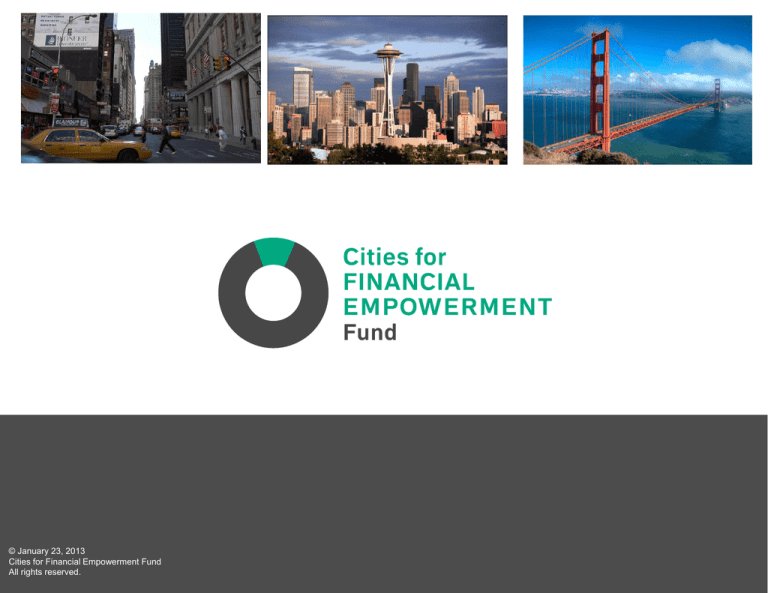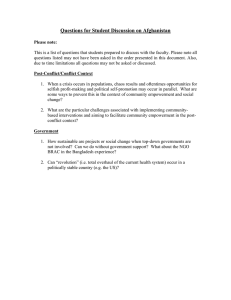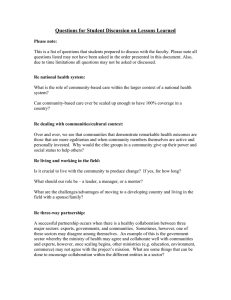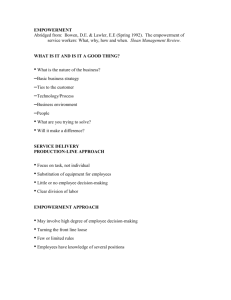
© January 23, 2013
Cities for Financial Empowerment Fund
All rights reserved.
www.cfefund.org
Financial Empowerment Center
Counselor Training Curriculum
Topic 9: Negotiation
www.cfefund.org
Questions to Think About
• What is effective negotiation?
• What kind of preparation is required for a negotiation?
• How do I ensure the other party keeps its side of the
negotiated agreement?
© January 23, 2013
Cities for Financial Empowerment Fund
All rights reserved.
www.cfefund.org I 3
What is Negotiation?
• “…back-and-forth communication designed to reach an
agreement between two or more parties with some interests
that are shared and others that may conflict or simply be
different.” (Moffit & Bordone: The Handbook of Dispute
Resolution)
• “Process through which parties move from their initially
divergent positions to a point where agreement may be
reached”. (Steele & Beasor: Business Negotiation – A
Practical Workbook)
© January 23, 2013
Cities for Financial Empowerment Fund
All rights reserved.
www.cfefund.org I 4
What is Negotiation?
• “Acceptable compromise by determining which needs
are fixed and which flexible for negotiators.”
(Fisher & Ury: Getting to Yes)
• “Break through the barriers: your reaction, their
emotion, their position, their dissatisfaction, their
power.”
(Ury: Getting Past No)
© January 23, 2013
Cities for Financial Empowerment Fund
All rights reserved.
www.cfefund.org I 5
What is Negotiation?
In a Nutshell:
Getting what each party wants via effective
communication and compromise.
© January 23, 2013
Cities for Financial Empowerment Fund
All rights reserved.
www.cfefund.org I 6
Effective Negotiation
Steps to A Successful Negotiation
1. Preparing
2. Negotiating From Position of Strength
3. Summarizing and Memorializing
Agreement
4. Delivering As Agreed
© January 23, 2013
Cities for Financial Empowerment Fund
All rights reserved.
www.cfefund.org I 7
Step 1: Preparing
Gather All Necessary Information
Answer the following questions:
1.
What information do I need to know?
2.
What resources do I need in order to negotiate this
account on behalf of my client?
3.
What are the accumulated late fees?
How many late payments have there been?
Has this account been negotiated before?
What is the client’s cash flow?
Does the creditor need a letter proving job loss?
Are there any proofs of previous payments?
Prepare all necessary documents and summarize the facts.
What legal rights are involved for each party?
© January 23, 2013
Cities for Financial Empowerment Fund
All rights reserved.
www.cfefund.org I 8
Preparation
4.
Who is the other party?
5.
What is the other party’s authority to negotiate?
6.
Is this the decision maker?
If third-party collector, do they have a WA license?
Do they have documentation of the debt?
What are the other party’s objectives?
7.
Is it the creditor, a third party collector, a buyer of the
account?
Is there an intermediary – A mediator, referee, another
counselor, attorney?
What does he need to accomplish? What does he have at
stake?
What motivates the other party?
Performances, commission.
© January 23, 2013
Cities for Financial Empowerment Fund
All rights reserved.
www.cfefund.org I 9
Preparation
• Likes and dislikes
Personal issues
• Find some common ground
What do both sides want?
• Consider the needs of everyone involved
© January 23, 2013
Cities for Financial Empowerment Fund
All rights reserved.
www.cfefund.org I 10
Preparation
Define Desired Outcome
• What is the range of acceptable outcomes?
Maximum (Ideal)
Minimum (Acceptable)
Be SMART
• What can both sides afford to lose?
Understand the consequences of the decision
© January 23, 2013
Cities for Financial Empowerment Fund
All rights reserved.
www.cfefund.org I 11
Preparation
• Consider alternative options, if an agreement cannot
be reached
• Prepare to walk away
Understand the consequences
Consider how to minimize effects
© January 23, 2013
Cities for Financial Empowerment Fund
All rights reserved.
www.cfefund.org I 12
Step 2: Negotiating From Position of Strength
• Understand negotiation strategies and tactics (the other
side is using them too)
• Frame and ask questions properly
• Assess and evaluate the offer (go back to the list of
desired outcomes from preparation)
© January 23, 2013
Cities for Financial Empowerment Fund
All rights reserved.
www.cfefund.org I 13
Effective Negotiation – Position of Strength
Negotiation strategies and tactics
• Negotiation decoy
• Extreme offer
• Nibble
• Cherry picking
• Flinch
• Good cop / bad cop
© January 23, 2013
Cities for Financial Empowerment Fund
All rights reserved.
www.cfefund.org I 14
Effective Negotiation – Position of Strength
Negotiation strategies and tactics
• Limits – Best offer, deadline
• Higher authority
• Take it or leave it
© January 23, 2013
Cities for Financial Empowerment Fund
All rights reserved.
www.cfefund.org I 15
Frame & Ask Questions
•
Framing questions properly sets stage for rapport,
sense of cooperation
•
“Cooperative” questions
What did you mean by…?
Can you tell me more about …?
Is it possible to…?
Please help me understand…
© January 23, 2013
Cities for Financial Empowerment Fund
All rights reserved.
www.cfefund.org I 16
Frame & Ask Questions
•
Questions that challenge, or escalate conflict
What??
Why??
Do you honestly expect me to…?
Isn’t it true that…?
© January 23, 2013
Cities for Financial Empowerment Fund
All rights reserved.
www.cfefund.org I 17
Assess & Evaluate Offer
Choose when, where and how to respond
• Allow time to respond appropriately
• Apply negotiation tactics
© January 23, 2013
Cities for Financial Empowerment Fund
All rights reserved.
www.cfefund.org I 18
Step 3: Summarize & Memorialize Agreement
After an agreement has been reached:
•
Summarize and restate terms with other party
•
Memorialize ASAP – Confirm by e-mail or fax
•
GET IT IN WRITING!!!!
© January 23, 2013
Cities for Financial Empowerment Fund
All rights reserved.
www.cfefund.org I 19
Step 4: Deliver As Agreed
• Review the offer’s terms for amounts, deadlines,
processes
• Deliver as agreed in a timely and appropriate manner
© January 23, 2013
Cities for Financial Empowerment Fund
All rights reserved.
www.cfefund.org I 20
Topic 9 Exercise #1
Role Play
All of the credit cards are jointly held. Bobby has a 712 credit score, and Marta has a
690 score. They recently missed the monthly payment on one of the cards by 15 days,
and were charged a $39 late fee.
The credit card company for which his payment was late, called Bobby at work, and left a
message with a co-worker asking him to call their 800 number. Bobby did get the
message, and the card company called again the next morning. This time, the caller left a
message saying that Bobby’s payment was overdue with his co-worker.
Marta has a savings account with $500 that pays $1.50% per year. On April 10, Bobby’s
mother and brothers sent him $1,500 for his birthday.
Is there anything that Bobby did that you would change, and if so, what would it
be and why?
© January 23, 2013
Cities for Financial Empowerment Fund
All rights reserved.
www.cfefund.org I 21




